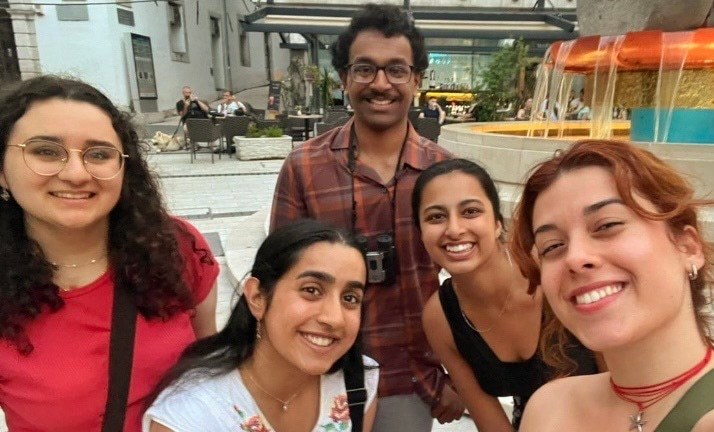Final Reflections: Leadership is about lifting others as you climb

Two years ago, I applied for the LSE Laidlaw Leadership and Research Scholarship with the belief that true leadership is about bringing people along with you. That belief still holds strong today.
Over the past two years, my understanding of leadership has evolved, but its core values remain the same: respect, initiative, and inclusion. Leadership is not a zero-sum game; one person’s success does not come at the cost of another’s. There is great wisdom in youthful instincts, and I have always believed that it is kind to be kind. Kindness will never be misplaced and stepping into the professional world should not mean letting go of the values that define us. I am proud to have stayed true to my instincts, even amidst the pressures young people face to conform to rigid professional expectations.
To me, leadership means standing up for what you believe in, even when faced with challenges and doubt. It is about staying true to your principles while remaining open to dialogue and collaboration. Engaging with different perspectives, especially those that challenge you, does not mean compromising your values, but rather strengthening them through thoughtful discussion.
Ultimately, leadership is about lifting others as you climb. Success is not just about reaching the top but about bringing people along with you.
Throughout my leadership journey, I have encountered a few unexpected lessons - perhaps the most surprising being just how easy it can be to create meaningful impact. I once believed that change was reserved for traditional leaders in positions of power, but I have come to realise that impact begins with simple acts. A kind word, a helping hand, a moment of genuine compassion—these small actions have the power to bring people together and create lasting support. People may not always remember what you achieved, but they will remember how you made them feel. Emotion is just as important as driving progress forward.
Another revelation has been the incredible capacity for creation when given the freedom to explore. Through the Laidlaw Foundation, I had the opportunity to lead an interdisciplinary research project alongside four brilliant and compassionate researchers. Together, we conducted fieldwork across four countries in four weeks—an experience that left me both amazed and inspired. Working across disciplines allowed us to draw from the strengths of each field, ultimately culminating in an innovative research report that reflected the best of our diverse perspectives.
Taking initiative in an environment with little direction has profoundly shaped my understanding of leadership. It has reinforced my belief that true progress is made when different voices come together, each bringing unique insights to the table. Leadership isn’t about having all the answers - it’s about creating the space for collaboration, innovation, and shared success.
The skills I have gained through the LSE Laidlaw Leadership journey will be invaluable as I begin my career in research and policy-driven decision-making. Engaging with diverse stakeholders across different professional levels has significantly strengthened my research strategy and ability to navigate complex policy environments.
During my Leadership-in-Action project with the UK national charity Magic Breakfast, I independently produced a policy report with recommendations to improve the uptake of free breakfast provisions, helping to reduce inequalities in primary education. Conversations with the Head of Policy reshaped my understanding of research, highlighting the importance of precision, deep policy knowledge, and feasibility in driving meaningful change. The rigor of this process made the work all the more impactful.
My research abroad in the Balkans further developed my adaptability, as well as my social and cultural awareness. Investigating the memory of the Yugoslav wars required sensitivity, ethical awareness, and a nuanced understanding of historical narratives across national and cultural lines. Engaging with firsthand accounts broadened my perspective, reinforcing the importance of ethical research in complex socio-political contexts.
These experiences have prepared me to step confidently into my professional career. I am equipped with the analytical skills, adaptability, and leadership mindset necessary to contribute meaningfully to research and policy development.

Please sign in
If you are a registered user on Laidlaw Scholars Network, please sign in